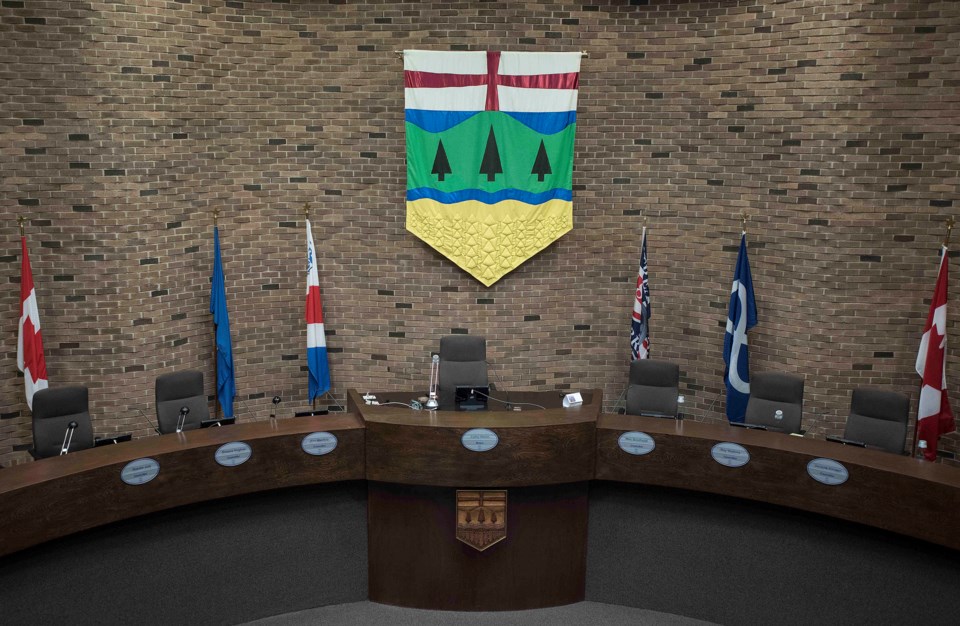A fee-for-disposal system could be coming next year for non-St. Albert residents looking to use the city's recycling and seasonal compost depots.
Council will be moving forward with a 2024 budget business case for a waste-disposal card, or fee-for-use, system at St. Albert's waste depots after a recommendation from administration came forward on May 16.
The system could generate new revenue for the city while improving the local waste-diversion rate, Katie Burd, a waste and diversion operations supervisor with the city, said during the May 9 committee of the whole meeting.
“First and foremost, allowing non-utility ratepayers to utilize the depots to dispose of divertible material otherwise destined for the landfill would increase the city's waste-diversion rate,” Burd said on May 9.
“It would also allow the city to offset some costs of operating the two depots on a cost-recovery basis.”
A report included in the May 9 meeting agenda said about eight per cent of 17,700 visitors to the Mike Mitchell Recycling Depot in summer 2019 were non-utility ratepayers, meaning non-residents and those who live in rental housing, whose taxes don't go towards the facility's operating costs. Another 917 were misinformed about what could be disposed of at the recycling depot, according to the report.
“In addition to non-ratepayers utilizing our depots, illegal dumping continues to be a problem,” the report says. “The cost of illegal dumping and depot misuse is ultimately borne by the ratepayers of St. Albert.”
A waste-disposal card system would have residents pay an annual fee to get an identification card to use recycling or compost depot facilities. Non-residents or contractors, who would not be able to get a card, would be charged an onsite fee higher than what residents would pay.
“There are many considerations to make when implementing such a program, including the implications and implementations of the city's cash handling (policy), the funding model ... charges per item, who is permitted to purchase a disposal card, and under what parameters the card can be used,” the report says.
However, an annual flat fee may not be enough to cover the city's costs to dispose of the items dropped off at the depots, the report says. Administration also says additional staff may be required to operate the program.
Coun. Mike Killick said he's not confident a fee-for-use system will accomplish what it's meant to do.
“There's a lot of costs associated with that,” he said, adding, “You would have to have someone there to monitor every load coming in ... you would then have to have someone assess how much they were going to charge, you're going to have to have a ... point of sale system, ... and then you'd have to issue a residence card to all residents.”
“I don't think it would even be a break-even, it would be an ongoing cost to implement something like that,” Killick said.
As administration has only completed a high-level analysis of the potential system, no concise estimates or proposed fee amounts have been determined.
Killick also said he worried that charging non-ratepayers to use the depots might lead to an increase in a illegal dumping in the community.
“My fear would be that if we charge people ... and they (say) ‘I'm not going to pay that’ and they get turned away, they'd drive down some rural road and dump it in the ditch,” he said.
“An unintended consequence that could actually be worse for the environment.”
Coun. Ken MacKay said he understood administration brought the recommendation forward in an effort to improve waste diversion and offset operating costs; however, he thinks the upcoming implementation of Extended Producer Responsibility (EPR) in Alberta will have a bigger impact.
The provincial EPR legislation, which came into effect last fall, will transfer the responsibility and cost for recycling collection and disposal from municipalities to industry organizations responsible for producing material like paper, plastic, and single-use items.
The program is being phased in over the next four years, and as the Gazette reported last week, the city is waiting for more information from the province.
“I think that we just don't know what all the ramifications are of that because these companies are going to be responsible for a whole life cycle of their product, and what does that mean for us in relation to picking up garbage or recycling,” MacKay said.
Council heard that depending on what information is provided about the EPR program by the province prior to the draft 2024 budget being presented to council in October, the fee-for-use business case may only affect the city's compost depot, and not the Mike Mitchell Recycling Depot.




